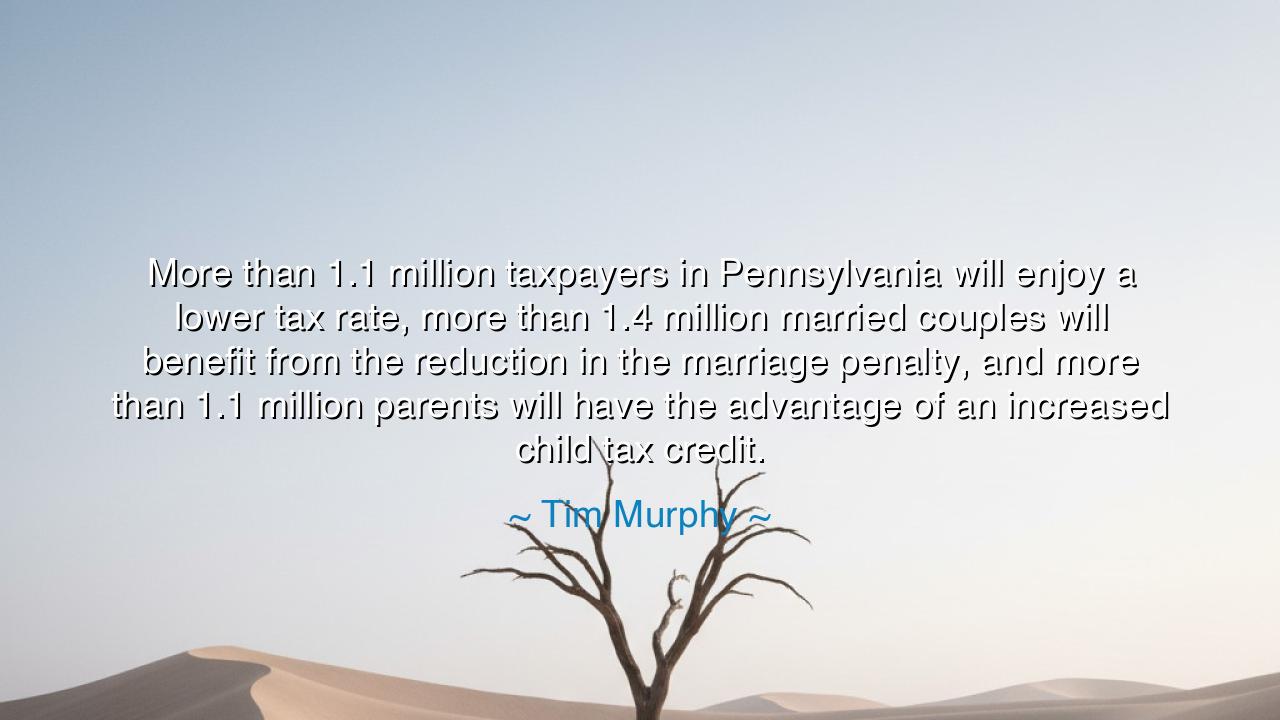
More than 1.1 million taxpayers in Pennsylvania will enjoy a
More than 1.1 million taxpayers in Pennsylvania will enjoy a lower tax rate, more than 1.4 million married couples will benefit from the reduction in the marriage penalty, and more than 1.1 million parents will have the advantage of an increased child tax credit.






“More than 1.1 million taxpayers in Pennsylvania will enjoy a lower tax rate, more than 1.4 million married couples will benefit from the reduction in the marriage penalty, and more than 1.1 million parents will have the advantage of an increased child tax credit.” — Thus declared Tim Murphy, not merely as a politician citing numbers, but as a man affirming the moral weight of justice, family, and responsibility within the structure of a nation. To the casual ear, his words sound as the language of finance; yet to the attentive spirit, they speak of something deeper — the eternal balance between the individual and the community, between duty to the state and compassion for the home. Beneath the surface of figures lies the timeless pursuit of fairness: that each person should reap not only what they sow, but also share in the prosperity of the society they sustain.
The origin of this quote lies in the early 2000s, in an era of reform and debate over the burdens of taxation in the United States. Tim Murphy, a congressman from Pennsylvania, spoke these words in support of tax relief measures designed to ease the strain on working families. He spoke for those who labored quietly in factories, offices, and farms — people who paid their dues, raised their children, and asked only that the weight of government not crush the fruits of their toil. His words, though bound to a specific policy, echo the larger vision that has guided just societies through the ages: that the state exists to serve the people, not to enslave them.
To lower the tax rate, to reduce the marriage penalty, and to increase the child tax credit were not, in Murphy’s mind, acts of charity, but acts of restoration — a correction of imbalance. For when the people’s labor is too heavily burdened, their spirit falters; when the bond of marriage is punished instead of rewarded, the foundation of family weakens; and when the work of parents is undervalued, the future itself is imperiled. Murphy’s declaration reminds us that economics, though often reduced to numbers and ledgers, is in truth the language of human dignity. Behind every policy lies the question of whether society uplifts its people or grinds them down.
This truth is not new. In the days of Solon, the Athenian lawgiver, the weight of debt had enslaved the poor and divided the city. Solon, seeing that freedom itself was at stake, reformed the laws to free men from debt bondage and restore balance between rich and poor. He did not seek to destroy wealth, but to temper it with justice. Likewise, Murphy’s vision was rooted in this ancient understanding: that a nation cannot endure when the common citizen feels forgotten. Just as Solon declared that equality before the law was the lifeblood of democracy, Murphy’s measures sought to give modern meaning to that principle — ensuring that the family, the most sacred unit of civilization, might breathe and thrive.
The marriage penalty he spoke of — a quirk of tax law that once caused some couples to pay more together than they would have separately — was, in essence, a subtle injustice. It placed a hidden cost upon the union of two lives, discouraging what society should instead strengthen. By lifting that burden, Murphy sought not only fiscal reform but moral repair. For marriage, as even the ancients believed, is not a contract of convenience but a bond of service and shared destiny. To preserve and honor it through wise governance is to defend the moral fabric of the nation itself.
So too did the child tax credit, though modest in numbers, carry great symbolic weight. It affirmed that the raising of children — the shaping of future citizens — is labor worthy of reward. It was a small acknowledgment of a vast truth: that parents, in their daily sacrifices, perform the quiet work of sustaining civilization. As the Roman philosopher Cicero once wrote, “The welfare of the people is the highest law.” Murphy’s advocacy echoed this wisdom: that when a government remembers its families, it remembers its purpose.
Thus, O listener, take from these words a lesson beyond the realm of policy. Whether you are ruler or citizen, parent or child, remember that justice begins not with power, but with compassion. Let every law, every act, and every decision you make serve not ambition, but balance. Guard against systems that burden the weak and reward only the strong. Support those who labor, protect those who nurture, and give dignity to those who build their lives in honesty. For in the harmony between government and the governed — between duty and mercy, law and love — the soul of a people is preserved.
And so, as Tim Murphy once reminded his generation, prosperity is not measured by gold or policy, but by how a society honors those who make its future possible — the worker, the spouse, the parent. Strengthen them, and the nation shall stand firm. Forget them, and even the greatest empires will crumble. For the wealth of a country is not in its treasury, but in the hearts of its families — steadfast, humble, and free.






AAdministratorAdministrator
Welcome, honored guests. Please leave a comment, we will respond soon